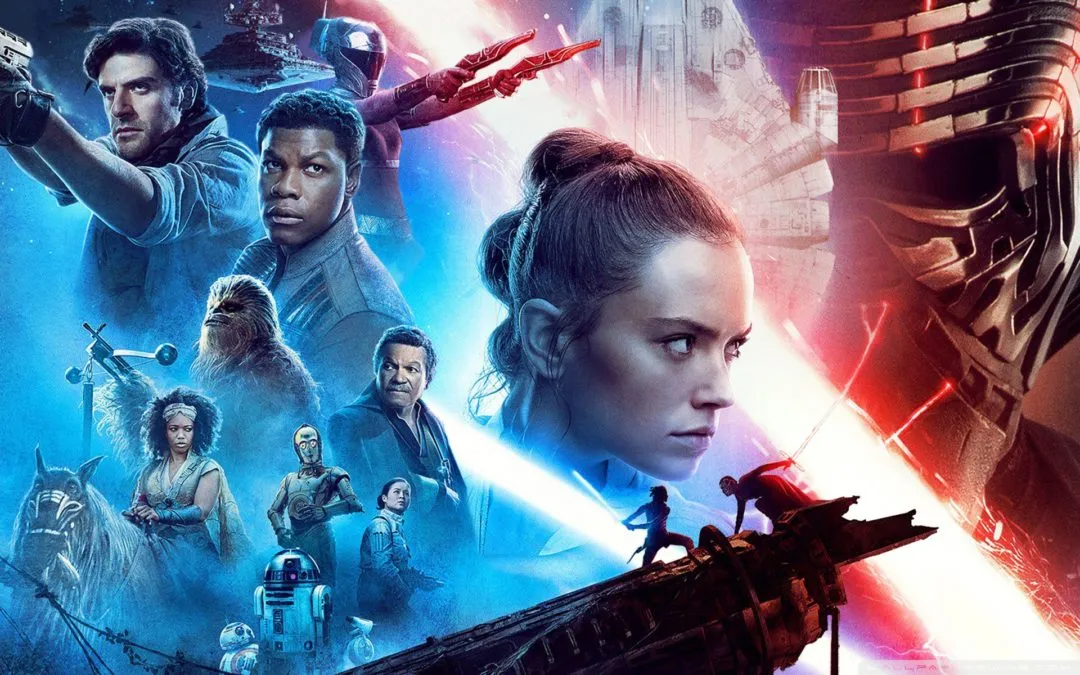The Star Wars prequels are an interesting artifact, in ways that are often overlooked and ignored by the films that have followed.
This should not be misconstrued as a full-throated defense of those three films, as has arguably become a recent trend. The prequels have a lot of serious problems. It is often impossible to separate the good and the bad within the Star Wars prequels. This is most obvious within Revenge of the Sith. A sequence in which Anakin Skywalker (Hayden Christensen) murders a bunch of children is undercut by the absurdity of watching professional actors try to sell the tragedy while solemnly using the word “younglings.”
George Lucas leans into this in the construction of the film. The genuinely operatic climactic lightsaber battle between Anakin and Obi-Wan Kenobi (Ewan McGregor) on the boiling lava world of Mustafar is crosscut with the high camp of a platform-hurling throwdown between Emperor Palpatine (Ian McDiarmid) and Yoda (Frank Oz) on the floor of the Senate.
The lines between good and bad often blur within the prequels as well. The original trilogy offers a mythic battle against rigidly defined forces of good and evil: the Jedi and the Rebels versus the Sith and the Empire. The prequels offer a much murkier depiction of the Jedi and the Republic than that suggested by Obi-Wan and Yoda in their dealings with Luke. Of course, The Empire Strikes Back suggests that the two masters are openly manipulating Luke to serve their own ends; they both lie to him about the identity of his father and his sister, because they worry about how that knowledge might affect him.
Based on the simple morality of the original trilogy, one might have expected the prequel trilogy to portray a straightforward story: the Sith defeating the Jedi and toppling the Republic in a dramatic coup, those heroic institutions caught off-guard by sinister forces. Based on Obi-Wan’s dialogue in Star Wars, one might assume that the Republic lost the Clone Wars to the Empire.

It is to Lucas’ credit that the prequels make a more daring and provocative argument. The Republic did not deserve to survive. The Empire did not invade or conquer the Republic but instead resulted from the exploitation of systemic and structural weaknesses. More than that, the Jedi failed in their responsibilities to the universe, both morally and politically.
The Phantom Menace makes it clear that the Republic is relatively prosperous. Naboo and Coruscant are thriving and diverse planets with sophisticated infrastructure. However, the film also confronts Queen Padmé Amidala (Natalie Portman) and Qui-Gon Jinn (Liam Neeson) with the kind of suffering that has been happening on worlds like Tatooine, where people are still bought and sold as slaves.
The Jedi in Star Wars have implicitly turned a blind eye to the slavery practiced by the Hutts. The opening scenes of Return of the Jedi demonstrate how easily a single Jedi could topple Jabba the Hutt’s regime, if they so wanted. “I didn’t come here to free slaves,” Qui-Gon states. Instead, he participates in slavery — he wagers Anakin’s life with Watto and separates Anakin from his mother.
In Attack of the Clones and Revenge, the Republic is eroded by a proxy war. Lucas was reportedly inspired by America’s political transformation during the War on Terror, how civil liberties were traded for the illusion of security. Attack of the Clones continues the idea of slavery as a foundational sin, with the Republic doomed by its choice to use a slave army composed entirely of clones.
It isn’t just the Republic. In Revenge of the Sith, Lucas repeatedly suggests that the Jedi have lost the high ground over the Sith. At one point, Palpatine tells Anakin that “good is a point of view,” mirroring Obi-Wan’s assurance to Luke in Return of the Jedi that his lies were “true… from a certain point of view.” Obi-Wan’s assertion that “only a Sith deals in absolutes” is the height of irony.

This is rendered explicit in the scene where Anakin rejects the Jedi and joins the Sith. Mace Windu (Samuel L. Jackson) has defeated Palpatine. “He must stand trial,” Anakin asserts. Windu insists that Palpatine is “too dangerous to be left alive” and attempts to kill him extrajudicially. This forces Anakin’s hand. Convinced the Sith can save his wife Padmé, Anakin kills Windu to save Palpatine.
Of course, Anakin’s motivations are entirely selfish. It is unclear whether he genuinely believes that Palpatine deserves due process, but this is transparently a last-ditch effort to keep Palpatine alive long enough to learn what the old man knows about resurrection and immortality. Still, allowing for this, the Republic may not have fallen had Windu upheld due process and respected the rule of law.
The Star Wars saga is a story of generational failure, the idea that all parents create an imperfect world for their children and that all children have an obligation to create a better one. The sequel trilogy has acknowledged this on a personal level with Han Solo in The Force Awakens and Luke Skywalker in The Last Jedi but has never really grappled with the ideas of the prequels.
It seems like the characters in the sequel trilogy have learned nothing from the tragedy of the prequels. The Force Awakens reveals the political body that arose from the collapse of the Empire was the New Republic, taking on the same name as the Galactic Republic. The brief glimpse of Hosnian Prime in The Force Awakens evokes the look of Coruscant in the prequel trilogy.
The sequel trilogy never bothers to articulate what the heroes are fighting for. “We are the spark that will light the fire that will restore the Republic,” boasts Vice Admiral Holdo in The Last Jedi, but there is never a strong argument about what the New Republic has learned from the failure of the Galactic Republic and why it deserves to survive. How is it different from what came before? What has changed? What will stop the New Republic from collapsing like the old?

The sequel trilogy largely avoids big political ideas. While the original Star Wars was an allegory for Vietnam and The Empire Strikes Back feels like the first ’80s blockbuster, The Force Awakens and The Last Jedi don’t grapple as overtly with the political moment. These politics are kept largely personal — Kylo Ren as a school shooter, Holdo as a woman in authority undermined by less qualified men.
This can be seen as part of a larger reaction against the prequels. The Force Awakens was pointedly a retelling of the original Star Wars. Recent films have eschewed the more diverse and ambitious settings of the prequels for the familiar desert/ice/jungle/forest planets that defined the original trilogy. Practical effects are prioritized. Continuity with the original trilogy is given focus.
The Disney Star Wars films largely mark a return to the political and moral simplicity of the original trilogy. The heroes are fighting to restore a vaguely defined Republic. Rey (Daisy Ridley) is learning to be a Jedi Knight. Even when Yoda destroys the repository of all Jedi knowledge in The Last Jedi, asserting that the next generation needs to grow beyond them, Rey has already secreted the books away.
While Rogue One and The Last Jedi introduce hints of moral complexity, they shy away from the heavier implications of these ideas. DJ (Benicio Del Toro) might point out that rebels buy weapons from arms traders too, but he’s dismissed as a cynic. Poe (Oscar Isaac) might be revealed to be a dangerous hot head whose instincts aren’t always right, but he’ll never face the consequences of his mistakes.
This nostalgia for the original trilogy is understandable. This article shouldn’t be considered prequel apologia. For all its flaws, even Solo is a much more entertaining film than either The Phantom Menace or Attack of the Clones. In terms of basic storytelling and construction, The Force Awakens and The Last Jedi are much more satisfying films than any of the prequels.
However, even acknowledging these problems, it would be a shame if the more interesting and ambitious ideas within the prequels were to be completely erased. The prequels introduced a more complicated and ambitious vision of the Star Wars universe. They suggested that any institution that betrayed its own principles was doomed to failure and collapse.
With The Rise of Skywalker fast approaching, the question remains whether the Star Wars franchise itself is finally strong enough to respond to the challenges posed by the prequels — and whether the ninth film in the saga might finally bring balance to the franchise.






Published: Dec 12, 2019 11:00 am